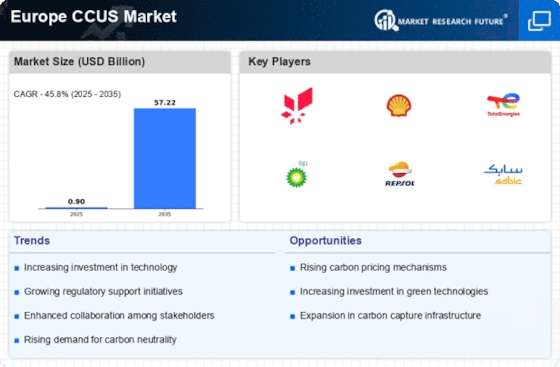Top Industry Leaders in the EUROPE CCUS Market
*Disclaimer: List of key companies in no particular order
Top listed global companies in the Europe CCUS industry are:
ExxonMobil Corporation
Royal Dutch Shell plc
Chevron Corporation
TotalEnergies SE
BP plc
Equinor ASA
Mitsubishi Heavy Industries Ltd.
Air Products and Chemicals Inc.
Aker Solutions ASA
Schlumberger Limited
Bridging the Gap by Exploring Top Leaders Competitive Landscape of the Europe CCUS Market
Europe's Carbon Capture, Utilization, and Storage (CCUS) market is experiencing a surge in activity, spurred by ambitious climate goals and a growing understanding of its vital role in decarbonization. This fertile ground has attracted a diverse set of players – each vying for a slice of the pie as the market matures. Analyzing their strategies, market share factors, and emerging trends is crucial to understanding the evolving dynamics of this critical sector.
Key Player Strategies:
Integrated Energy Giants: Companies like Shell, ExxonMobil, and TotalEnergies leverage their existing infrastructure and financial muscle to secure large-scale projects, focusing on value chain integration and technology leadership. Shell's Northern Lights project in Norway, capturing CO2 from onshore industrial emitters for offshore storage, exemplifies this approach.
Engineering and Technology Leaders: Aker Solutions, Siemens, and Mitsubishi Heavy Industries capitalize on their engineering expertise to develop novel capture technologies and transportation solutions. Aker's partnership with Equinor on the Troll A platform capture project showcases their focus on pre-combustion capture in the hard-to-decarbonize cement industry.
Emerging Innovators: Start-ups like Climeworks and SwissCarbonTech are disrupting the market with innovative direct air capture (DAC) technologies, targeting difficult-to-capture emissions and exploring CO2 utilization pathways. Climeworks' focus on building modular DAC plants highlights the potential for distributed capture solutions.
National Champions: State-backed utilities and energy companies like Vattenfall and Fortum play a crucial role in their respective domestic markets, driving policy development and securing funding for large-scale capture projects. Vattenfall's involvement in the Rotterdam Porthos project reflects this trend.
Market Share Analysis:
Technology Expertise: Leading capture technology providers like Aker, Shell, and ExxonMobil are expected to hold significant market share due to their proven track records and ongoing R&D investments.
Project Portfolio: Early movers with a secured pipeline of large-scale projects, like TotalEnergies in France and the UK government's CCS deployment strategy, will likely dominate the initial market phase.
Policy Frameworks: National and EU-level regulatory frameworks shaping carbon pricing, storage permits, and financial incentives will influence how different players compete and who benefits the most.
New and Emerging Trends:
CO2 Utilization: Moving beyond mere storage, companies are exploring CO2 utilization pathways for creating synthetic fuels, building materials, and other valuable products, adding an exciting dimension to the market.
Digitalization and Optimization: Integrating advanced analytics and AI into CCUS operations is gaining traction, enabling real-time data-driven decision making and efficiency improvements across the value chain.
Cross-border Collaboration: The interconnected nature of the Carbon Capture, Utilization, and Storage (CCUS) network necessitates regional and international collaboration for efficient storage infrastructure development and shared expertise.
Overall Competitive Scenario:
The European CCUS market is currently in a pre-competitive phase, characterized by a diverse mix of players jostling for dominance. Strong government support, coupled with continued technological advancements and rising carbon prices, will drive rapid market growth in the coming years. While established energy giants and technology leaders hold an early advantage, the market remains open for disruptive innovation and nimble newcomers. Success will hinge on a combination of factors – competitive cost structures, strong partnerships, strategic project selection, and adaptability to evolving regulatory and technological landscapes. The players who master this complex balancing act will emerge as the frontrunners of Europe's clean energy future.
Latest Company Updates:
ExxonMobil Corporation:
- Investing in CCUS research and development, including collaboration with MIT on advanced capture technologies. (Source: ExxonMobil website, "ExxonMobil Research and Development", accessed January 29, 2024)
Royal Dutch Shell plc:
- Developing the Quest CCS project in the Netherlands, capturing CO2 from a Shell refinery and other industrial sources. (Source: Shell website, "Quest CCS Project", accessed January 29, 2024)
Chevron Corporation:
- Collaborating with TotalEnergies on CCUS research and development. (Source: Chevron website, "Chevron Technology Ventures", accessed January 29, 2024)
TotalEnergies SE:
- Partnering with Chevron on CCUS research and development. (Source: TotalEnergies website, "Innovation and R&D", accessed January 29, 2024)










